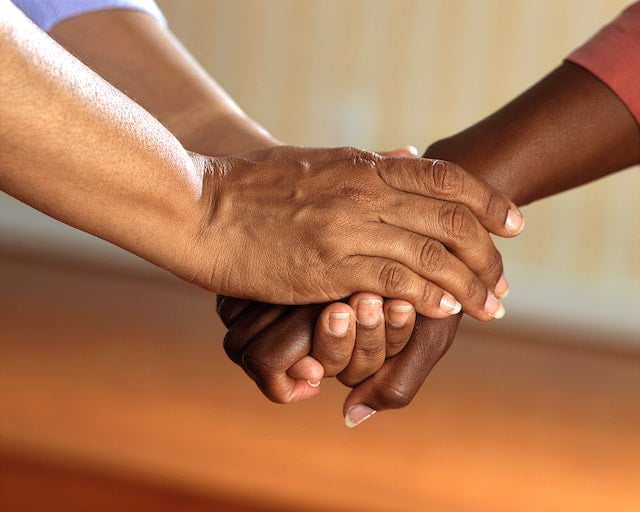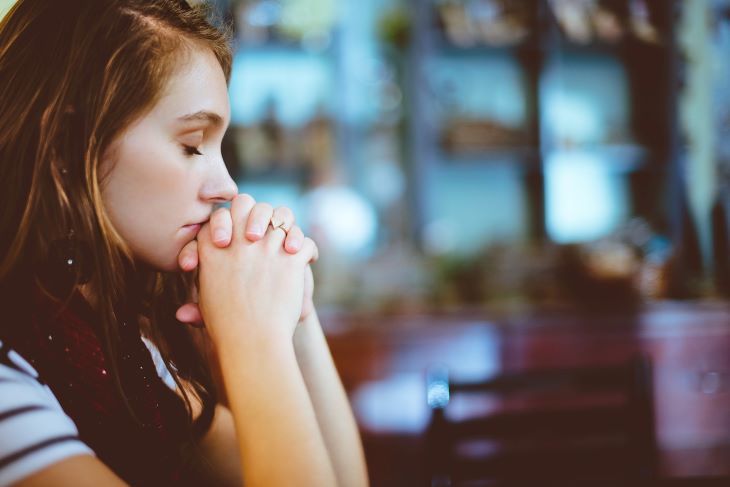A relapse is when someone’s medical condition, whether that’s a disease, illness or addiction ends up coming back and gets worse after it had previously ended or improved.
When it comes to addiction specifically, a relapse is when an individual’s starts to abuse drugs and alcohol again after they had previously received treatment and stopped abusing drugs or alcohol, known as abstinence.
For example, if you were addicted to alcohol and sought support for that addiction via treatment, you might not pick up another drink for six months. However, if you were to start drinking again then this would be known as a relapse.
A relapse tends to happen when the individual undergoes tough periods of their life, where they might feel depressed, stressed or out of control.
Unfortunately, after someone suffers from an addiction issue it is very hard for them to rebuild their life, and many people find the process of recovery quite stressful [1].
For example, you might need to move home in order to recover, find new friends or start a new job. This could result in them turning to the addictive substance to try to deal with these new stresses.
How Common Are Addiction Relapses?

Unfortunately, relapses are extremely common when it comes to addiction. It is not only very common for people to relapse when recovering from an addiction to drugs or alcohol, but it is expected for some people.
Unfortunately, many people return to their addictive substance within the first few months of leaving rehab and recovering.
Relapses are so common these days when it comes to addiction, that some recovery plans and models even include relapses as part of their process, as some see it as an inevitable and necessary part of the long term recovery process.
In fact, some people relapse a few times before they finally recover for good.
The Stages of Addiction Relapse

If you or someone you know is currently undergoing treatment for a drug or alcohol addiction, then it is important to understand that you might relapse during your recovery.
It is also important to understand how relapses work so that you know what to expect and know what signs and symptoms to look out for, whether that be in yourself or someone you know undergoing treatment.
Relapses are not an overnight thing, they happen over a period of time and in stages. This is why OK Rehab has taken the time to explain the stages of a relapse below.
1. Emotional addiction relapse
Emotional relapse is the first stage of the relapse process. Most people aren’t even aware that they are undergoing an emotional relapse during this stage.
At this stage of a relapse, you might not be consciously aware that you want to relapse or that you are considering it.
However, you might find yourself feeling more anxious, stressed or depressed; emotions which can easily lead to a relapse.
You might find yourself no longer wanting to attend self help groups or counselling sessions, and you might find yourself disregarding your self-care by eating worse or skipping workouts.
You might also see yourself withdrawing from seeing family or friends, which might result in feelings of loneliness and depression.
What to do if you or someone you know is emotionally relapsing
If you think that someone you know is undergoing an emotional relapse, then the best thing that you can do is support them.
They might not know or recognise that they are undergoing an emotional relapse, but you should always be on hand to look out for signs of a mental relapse, and be there to support them emotionally.
2. Mental addiction relapse
Mental relapse is the second stage of any relapse. At this stage, you will now be consciously thinking about relapsing. You might start to fantasise about using again, and will try to plan ways of getting your hands on the addictive substances again.
They will also start to miss things associated with their drug and alcohol addiction, including people and certain places they used to go to get access to their substances.
It is at this point that you should speak up if you start to experience a mental relapse. You should still try to engage with any self-help or aftercare groups you attend, and this is the perfect place to talk through any worries or concerns you might have about a mental relapse.
If you are a loved one of someone currently trying to recover from a drug and alcohol addiction, then you should look out for the signs and symptoms of a mental relapse.
Some signs and symptoms of a mental relapse would include things like talking about their substance use addiction more often, going missing for certain periods of time, withdrawing from family, friends and any self-help groups they may attend and becoming defensive around their addiction and recovery.
What to do if you or someone you know is mentally relapsing
If you or someone you know is mentally relapsing, then the best thing that you or they can do is speak to a professional for help.
You should always turn to your self-help groups for help and support, or alternatively, you should speak to your local GP or therapist to ask for more ongoing help and support in order to ensure that you do not relapse physically.
3. Physical addiction relapse
Finally, a physical relapse is the last stage of the relapse process. This is when an individual physically releases by using drugs or alcohol again. Unfortunately, when people do this it usually isn’t a one-off event.
Usually, people struggle to stop abusing and find themselves struggling with their addiction issues all over again.
At this stage, individuals will most likely go missing for periods of time, spend time with their old friends who most likely also abuse drugs and alcohol, and might lie in order to continue abusing drugs and alcohol again.
What to do if you or someone you know is physically relapsing
Once an individual has physically relapsed, they will need to attend drug and alcohol rehab once again in order to recover. This might mean that they need to attend outpatient or inpatient rehab once again, and will have to undergo a detox if their addictive substance is physically addictive.
They will also need to undergo a range of different treatment options such as cognitive behavioural therapy or group therapy.
Is Addiction Relapsing Failing?

It is important to understand that whilst relapsing might feel like failing, it is not. Whilst most professionals within the drug and alcohol recovery industry see relapsing as a sometimes necessary part of the long-term recovery process, most patients see relapsing as failing.
It’s easy to see why people see relapsing as failing. Individuals in recovery work so hard to recover, undergoing a detox and therapy. They work so hard and see a relapse as a major setback. They might think that all their hard work has gone down the drain.
However, it is important to remember that most people do relapse at some stage during their recovery process, and not all of your hard work has gone down the drain. The tools, techniques and mindset hacks that you learnt during your initial recovery will still be there for you to help you recover again.
If you are currently recovering from an addiction to drugs or alcohol, then it is important to see relapse as a normal part of the recovery process so that you do not view it as a failure if it were to happen to you or someone you know [2].
How to Respond to Addiction Relapse in the Right Way

If you or someone you know is currently at any stage of a relapse, whether it is an emotional relapse, a mental relapse or physical relapse, then the best thing that you can do is seek professional help.
What to do if you are currently relapsing
If you are currently undergoing an emotional, mental or physical relapse, then the best and first thing that you should do is seek professional help. You should try to speak to your local GP or therapist for help and support.
What to do if someone you know is currently relapsing
If someone you know is currently relapsing, then the best thing that you can do is to voice your opinion and let them know that you are concerned about them. You should get them the right kind of help from trained professionals and specialists.
You should be on the lookout for different signs and symptoms to check to see if they are moving through the different stages of a relapse.
You should try to remain patient with the individual, and show that you only have their best interests at heart by showing them kindness and respect.
If a loved one is relapsing, then it is important to remain strong and focused. If they have an aftercare and support plan available, then you should make sure that you have a plan of what to do in case of a relapse.
You should also try to avoid any stressful situations, as this might trigger them into abusing drugs and alcohol.
Addiction Relapsing – The Risk Factors

When it comes to relapsing, there are a number of risk factors that make it more likely for you to relapse in the future. Some of these risk factors include environmental factors, whilst others are more personal.
It is important to remember that a relapse can happen days, weeks, months or even years after an individual leaves treatment and enters recovery for a drug and alcohol addiction.
There are also different risk factors at different stages of recovery, which might only impact you a few weeks or months after entering recovery.
The more risk factors you are exposed to, then the more likely it is that you will relapse in the future. This is why it is important to try to avoid these risk factors affecting you. Some of the most common risk factors when it comes to relapsing are listed and explained further below [3].
1. Being exposed to triggers
One of the biggest reasons why someone might relapse is because they have been exposed to a trigger. A trigger is something that creates internal conflict and emotion, which might make them reach for the addictive substance.
This could include visiting a certain location, seeing a certain person, talking about a certain subject or simply being exposed to the addictive substance.
Everyone’s triggers will be different, and you would have worked hard during your treatment to establish and recognise what your triggers are and how you can avoid them.
However, life gets in the way and sometimes it can be hard to avoid your triggers completely during day-to-day life, which is why a lot of people relapse when they come face to face with their triggers for the first time since leaving rehab treatment.
2. Stressful situations
Stressful situations are also a huge risk factor for most people who are in recovery. Lots of people who abuse drugs and alcohol also suffer from poor coping skills when it comes to stress and stressful situations, which is what led them to their addiction in the first place.
When individuals are stressed, they can react in a number of different ways including anxiety, anger, depression and paranoia which could trigger you to turn to drugs or alcohol.
It is incredibly hard to avoid experiencing stress during day to day life outside of a rehab facility, whether it’s dealing with a new job, a new living situation or having to manage your finances. This is why stress is a huge risk factor when it comes to relapsing.
3. Arguments with friends and family members
Conflict and arguments with loved ones can play a huge role in someone relapsing from drug and alcohol recovery. This is because when you argue with someone you care about you go through a whole range of emotions including stress, anger, anxiety, sadness and frustration.
People who suffer from addiction issues often struggle with managing their emotions, which is often what attracted them to drugs and alcohol in the first place.
This is why arguing with close loved ones is often a huge risk factor for people when it comes to relapsing and recovery from drugs and alcohol.
4.Peer pressure
Unfortunately, a lot of people become addicted to drugs and alcohol in the first place because of peer pressure. We’ve all been there, when a friend or peer has made you feel the need to join in on something, even when deep down you really don’t want to.
Getting involved in the wrong crowd often means that you are subjected to peer pressure, and you are a lot more likely to find yourself abusing drugs and alcohol if your friends or peers are.
Once you leave rehab, you should try to avoid spending time with anyone who is still using and abusing drugs and alcohol.
However, for a number of different reasons (including employment, financial and housing issues) this simply is not possible for a number of people leaving rehab.
This is why a lot of people end up spending time with people who still abuse drugs and alcohol, and fall into the trap of peer pressure once again.
5. Social isolation
On the opposite end of the spectrum to peer pressure, some people relapse from drugs and alcohol because they feel too isolated.
When you leave rehab, it is easy to feel lonely and misunderstood. For starters, you’ve just left a rehab facility where everyone you are surrounded by is either going through the same thing as you, or is there to try to help you overcome your addiction issues.
Once you leave this environment, it is easy to feel lonely and isolated. Leaving rehab might also mean that you have had to make some pretty big changes in your life, like moving houses or even moving to go and live in a different town.
This is why a lot of people end up feeling lonely when they leave rehab, which is a huge risk factor when it comes to relapsing.
Even if you are surrounded by people, it might be hard for them to understand exactly what you have been through, which might make you feel like no one ‘gets it’ or is there for you.
6. Health issues
Health issues play a huge role when it comes to relapsing. Unfortunately, those with ongoing drug and alcohol issues also suffer from a number of health issues.
Whilst you will have received help and medication for these health issues whilst at rehab, some of them require more ongoing health support.
Dealing with any sort of chronic pain can be testing for anyone. However, it is particularly testing for people also trying to recover from a drug and alcohol addiction alongside having to deal with health issues.
Anyone dealing with pain might relapse in an attempt to mask the pain they are feeling, whether that is physical or psychological.
7. Low self-esteem
Low self-esteem is another risk factor when it comes to relapsing from drug and alcohol addiction.
Studies have shown that individuals with low self-esteem find it harder to stay sober and therefore have a higher risk of relapsing in the future.
This is because they might be feeling self-conscious whilst in a particular setting, and use alcohol or drugs as their coping mechanism for when they feel this way.
8. Positive moods
Surprisingly, being in a good mood can also put you at more of a risk of relapsing. Whilst most people think that you have to be in a negative mood in order to relapse, this simply is not the case.
Many people relapse when they are in a good mood, as they might get overexcited or feel ‘giddy’ whilst celebrating or seeing friends.
In addition to this, people often find themselves relapsing with drugs and alcohol when they are out celebrating in a setting that would usually involve alcohol, such as a night out, a pub or a wedding.
As you can see, there are many different risk factors when it comes to addiction and relapsing, which you should aim to avoid where possible.
If your loved one is currently in recovery and you want to protect them as much as possible from relapsing then it is important to have these risk factors in mind, so that you can help to protect and shield your loved one from them.
However, it is important to remember that you will not be able to shield your loved one from every risk factor under the sun, and at some stage you will have to ease your loved one back into everyday living where they will be confronted with some of these risk factors.
This is inevitable, and you must do your best to ease them back into normal life whilst helping to support and navigate them through these risks.
What to Do Right After an Addiction Relapse

When you or someone you know relapses, it is hard to know what to do immediately after. Often, this responsibility falls to the people around the individual who has just relapsed, as sometimes they are in no fit state to get the help they need.
Relapses are a huge setback when it comes to recovery. However, it is important to remember that they are a very common part of the recovery process, and there are a number of processes in place to help to get you back on track.
If you have just relapsed, then there are a number of things you should and need to do in order to ensure that you get past this hurdle and continue your recovery journey.
Ask for help
One of the very first things you should do after relapsing is ask for help. You could ask a loved one, a family member, friend or professional for help. You should tell them that you have relapsed and that you need help to seek professional help.
You should then speak to a professional about what happened, and they will assess whether you need to attend inpatient or outpatient rehab, depending on your current state of health and how severe your relapse was.
Engage in self help groups
One of the best things you can do after relapsing is engage in a local self help group. This way, you will be surrounded with other like minded people who have probably been through something similar to you.
There are lots of different self help groups out there these days, but the most well known and popular are still Alcoholics Anonymous, Narcotics Anonymous and SMART Meetings.
Try to avoid all triggers
As discussed above, one of the biggest risk factors of relapsing is exposure to triggers. This is why you should aim to avoid all triggers after relapsing. You can do so by attending inpatient rehab, but it is important that you draw your own boundaries when it comes to triggers.
Be kind to yourself
If you have just relapsed, then you might feel angry at yourself, and as a result feel like you need to punish yourself in some way. However, punishing yourself is the worst thing you can do after a relapse.
If you have recently relapsed, then it is important to engage in self care activities. This could include things like eating good food, exercising regularly, journaling, meditating and treating yourself to a bit of a pamper.
This will not only boost your mood, but it will also increase your self esteem, which is vital to your recovery and avoiding relapsing.
Give yourself time to reflect
Unfortunately, when people relapse from a drug and alcohol addiction they often want to forget that it ever happened and move on as quickly as possible.
However, it is important, to some degree, to take some time to reflect upon what happened and why it happened in the first place. This will help you to grow and develop, so that you do not relapse again in the future.
Create a relapse prevention plan
If you have just relapsed from a drug and alcohol addiction, then you would benefit from creating a relapse prevention plan for the future.
A relapse prevention plan is a great tool used in rehab centres to help individuals to create their own plan for when they leave treatment. This plan will consist of a range of tips and techniques on how to remain sober.
You should create a list of meditation techniques that you find helpful, as well as a list of local self help groups or helplines to call in case you need help and support.
You should also nominate someone to be your ‘in case of emergency’ contact, so that when you need help you can always call upon them for their help and support.
You should also include the HALT technique to relapse prevention [4]. The idea behind this technique is that if you feel a craving for either drugs or alcohol, you should always check to see if you are hungry, angry, lonely or tired first.
If you are, then cure that craving. As a result, you will often find that your initial craving for drugs or alcohol has now disappeared [4].
The main takeaway is that if you have relapsed, then you might need professional help in order to get back on track to recovery.
This is completely normal, and it is important to remember that you shouldn’t be embarrassed about relapsing, as this is very common when it comes to recovery from drug and alcohol addiction.
Call our helpline on: 0800 326 5559
Speak to the team at OK Rehab
If you or someone you know is worried about relapsing, then it is important to seek professional help. The team at OK Rehab are trained in dealing with people who have recently relapsed, and will be able to offer a range of advice and treatment options.
Start today by calling our friendly and professional team on 0800 326 5559 or by visiting our website online by going to www.okrehab.org.
References
[1] https://adf.org.au/reducing-risk/relapse/
[3] https://www.va.gov/WHOLEHEALTHLIBRARY/tools/reducing-relapse-risk.asp





